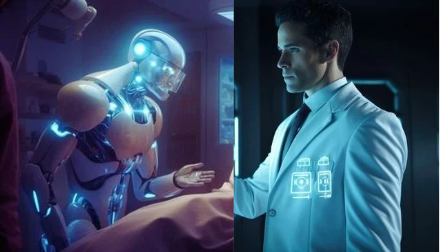AI and Blockchain

Blockchain and artificial intelligence innovations are transforming the healthcare industry. AI technologies can help understand human orders and offer the best feedback needed. For stance, the AI can assist in identifying anomalies on MRI scans and X-ray imaging. The AI and Blockchain are making a huge difference in areas like:
Data on healthcare.
Analytical technology for treatment plans and patient diagnosis.
Medical risk management.
Displaying of medical records.
Enhanced informed decision making.
Service delivery.
Medical costs.
What is Blockchain?

The blockchain is a distribution of databases through applying of state machine replication. The changes in the database are referred to as transactions grouped into blocks. The blockchain technology concept was invented and gained popularity from the introduction of Bitcoin in the space of decentralized electronic currency. The blockchain structure can help health care systems in connection to patient illnesses. The combination of AI and blockchain can help health experts achieve the following:
Improved patient overall state.
The medical diagnosis.
Patient recovery system.
The analysis of clinical decision-making computational studies.
The technology helps to make quality surgical interventions through consistent operations.
Blockchain helps advance the feasibility of diagnosis and patient care.
Advanced data analysis and screening.
The integration of AI and Blockchain
The area of AI and blockchain has vast progress every day. The one focus is in the medical records and information flow using the blockchain via HER systems. The data is processed directly in the blockchain algorithms. Thus, the data is protected from breach and enables critical analysis and implementation.
The coverage of blockchain and next-generation AI technologies to decentralize and accelerate biomedical research and healthcare helps improve deep learning. Deep learning comprises of AI techniques that aid in improved system efficiency and is used in medical diagnostics, lab analysis, drug classification and cellular analysis.
Surprisingly, blockchain helps to decentralize data within the hospital units. The combination of AI and blockchain is being used to make most of the new symptoms and instances for lung cancer patients without violating their privacy. Besides, the approach offers a local learning model for big data evaluations relating to lung cancer CT scans. Both technologies combined improve the likelihood of detecting lung cancer patients.
Conclusion
The future of the medical sector looks promising as healthcare experts will have access to the new blockchain. The technology will help to display the medical records of the patients and integrate with AI. Thus, by integrating the latest technology in the medical sector, future advancement in these areas will help improve service efficiency, reduce costs and democratize healthcare.
PHOTO CREDIT:GOOGLE.COM
Written by: Ameddic.com
